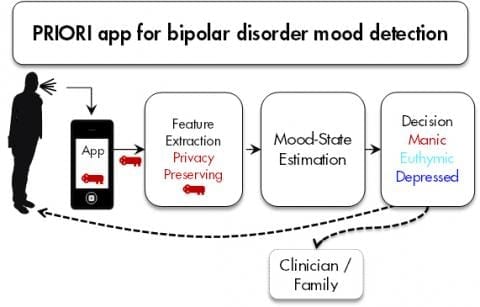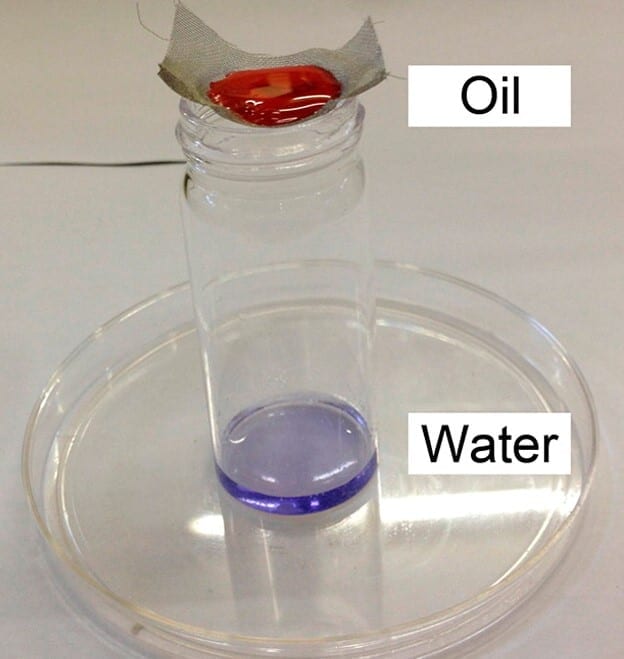
Subtle changes could act as early warning of need for care, U-M research suggests
A smartphone app that monitors subtle qualities of a person’s voice during everyday phone conversations shows promise for detecting early signs of mood changes in people with bipolar disorder, a University of Michigan team reports.
While the app still needs much testing before widespread use, early results from a small group of patients show its potential to monitor moods while protecting privacy.
The researchers hope the app will eventually give people with bipolar disorder and their health care teams an early warning of the changing moods that give the condition its name. The technology could also help people with other conditions.
More patients, all taking part in the study funded by the National Institute of Mental Health and facilitated by the Prechter Bipolar Research Fund at the U-M Depression Center, have already started to use the app on study-provided smartphones. As more patients volunteer, the team will continue to test and improve the technology.
The U-M team, led by computer scientists Zahi Karam, Ph.D. and Emily Mower Provost, Ph.D., and psychiatrist Melvin McInnis, M.D., presented its first findings today at the International Conference on Acoustics, Speech and Signal Processing in Italy, and published details simultaneously in the conference proceedings.
They call the project PRIORI, because they hope it will yield a biological marker to prioritize bipolar disorder care to those who need it most urgently to stabilize their moods – especially in regions of the world with scarce mental health services. Bipolar disorder affects tens of millions of people worldwide, and can have devastating effects including suicide.
But first, based on these encouraging findings, the technology and algorithms will be developed via research involving 60 American patients who receive treatment from U-M teams at the nation’s first center devoted to depression and related disorders.
“These pilot study results give us preliminary proof of the concept that we can detect mood states in regular phone calls by analyzing broad features and properties of speech, without violating the privacy of those conversations,” says Karam, a postdoctoral fellow and specialist in machine learning and speech analysis. “As we collect more data the model will become better, and our ultimate goal is to be able to anticipate swings, so that it may be possible to intervene early.”
Adds McInnis, a bipolar specialist, “This is tremendously exciting not only as a technical achievement, but also as an illustration of what the marriage of mental health research, engineering and innovative research funding can make possible.”
He adds, “The ability to predict mood changes with sufficient advance time to intervene would be an enormously valuable biomarker for bipolar disorder.”
The Latest on: Voice analysis
[google_news title=”” keyword=”Voice analysis” num_posts=”10″ blurb_length=”0″ show_thumb=”left”]
via Google News
The Latest on: Voice analysis
- The Voice to Parliament Handbook, Lola in the Mirror, Fourth Wing and Welcome to Sex among the 2024 ABIA winnerson May 9, 2024 at 5:45 am
The Australian Book Industry Awards recognise the talented authors and publishers behind the books that generated the most buzz in the last 12 months.
- Philippines Voice Recognition System Market Update Companies Showing Sign of Enormous Growthon May 9, 2024 at 12:12 am
[Download Free Sample] Report Ocean is delighted to unveil an exhaustive analysis of the Philippines Voice Recognition System Market, presenting a detailed exploration of its various dimensions from ...
- Why attention matters in reporting: It’s time to redefine share of voiceon May 8, 2024 at 1:36 pm
With the current industry standard of competitive reporting, a standard share of voice analysis essentially looks at ‘share of spend’. The issue here is that this analysis assumes all channel spends ...
- Biometix adds face analysis based on draft standard to biometric assessment toolboxon May 7, 2024 at 9:55 am
Biometix has developed a new biometric face analysis engine for assessing the quality of facial images, and their suitability for biometric comparison.
- Google is rolling out "audio emoji" for voice calls, and they're really dumbon May 2, 2024 at 12:08 pm
As 9to5Google highlights, the tech giant is rolling out audio emoji in its phone app for some reason. The feature is launching with six sound effects ...
- Fisher Capital Sponsoring The Right Wing Voice Podcast Hosted by Alexander Spellaneon May 2, 2024 at 8:19 am
Fisher Capital Sponsoring The Right Wing Voice Podcast Hosted by Alexander SpellaneNew York - May 2, 2024 — Fisher Capital is proud to ...
- Tampa symposium for voice AI attracts startups from around the worldon May 2, 2024 at 4:31 am
The symposium discussed how this emerging AI space wants to change the clinical environment. But first, industry stakeholders will need to solve the puzzle of approval, panelists said.
- AI Speech Analysis Shows Promise in Preventing Potential Suicideson May 1, 2024 at 8:05 pm
This model analyzes voice waveform modulations to decode emotional states ... This study underscores the potential of AI-driven speech analysis in augmenting suicide prevention efforts, offering ...
- AI voice analysis gives suicide hotline workers an emotional dashboardon May 1, 2024 at 12:11 am
An AI model accurately tracks emotions like fear and worry in the voices of crisis line callers, according to new research. The model’s developer hopes it can provide real-time assistance to phone ...
- Why did the Voice referendum fail? We crunched the data and found 6 reasonson April 30, 2024 at 9:58 pm
From a lack of bipartisan support to other concerns such as rising cost of living, a complex array of reasons contributed to the Voice referendum’s failure in October 2023.
via Bing News









